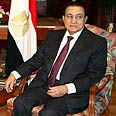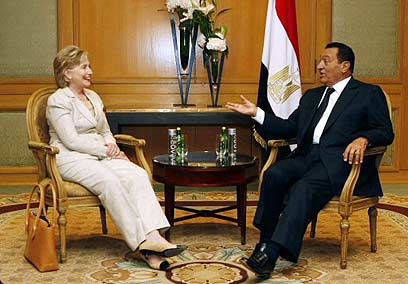

"We were about to have Shalit released to us, but an intervention by external elements disrupted the process and led to delays," he said, noting that Egypt was involved in the matter together with Germany.
In an interview broadcast Monday night ahead of Mubarak's meeting with US President Barack Obama, he refused to commit to an imminent solution to the matter.
He added that Israel was also responsible for the delay in Shalit's release. "We agreed on the release of a certain number of prisoners, and then Israel added restrictions which prevented progress," he said.
The Egyptian leader added, "We are making efforts, the Germans are willing to help us, and we welcome that. According to the deal, we were supposed to get Shalit and Israel should have released a certain number of prisoners. Had it been done, we would have handed Shalit over to the Israelis. We continue to work in that direction and hope for a good ending."
The Egyptian president said Israeli-Palestinian negotiations should concentrate on an overall peace deal, rather than getting hung up on the settlement issue.
"If Israel solves the problem between them and the Palestinians, and two states are established, Israel with Palestine, two states, I think Arabs, we can have normal relations with Israel," Mubarak said.
"Instead of saying stopping more settlements, and we heard this many times, now for over 10 years, and (they) never come to a stop, what I can say is that we have to consider the whole issue holistically, to negotiate on the final resolution."
Mubarak said he supports discussing the borders of the future Palestinian state first. He believes defining the borders would help solve the other core issues as well. He defined the Israeli government's acceptance of a two-state solution as "a first positive step."

Mubarak meets with Clinton, Monday night (Photo: Reuters)
As for the intra-Palestinian issue, Mubarak said that Egypt was making "an exhausting effort" to unite Hamas and Fatah, stressing that unity must be implemented before a peace agreement between Israel and the Palestinians.
"We are doing the best we can to bring about reconciliation between Hamas and Fatah. The process continues and we have great hopes to end it successfully."
Mubarak also spoke about the "clear link between Iran and Hezbollah in Lebanon and Hamas in Gaza." According to him, "The Iranians don't care about Gaza and Lebanon. Iran has problems and is blaming external elements which are pushing for protests. But I would like to take this opportunity to tell the Iranians, 'Don't intervene in the internal issues of Lebanon and the Palestinians.'
'Egypt will remain stable'
Asked whether he designated his son Gamal to succeed him, Mubarak said, "I have two years till the end of my term. I am not seeking another term, but I am focusing on completing my plan for the citizens, and it's progressing very well."
He added that the issue of having his son take his place was never discussed by them. "He started in banking and was against joining the party. I am not working to have my son succeed me. It's the people's decision to elect the man they trust. Who will it be? We have a long time ahead. There are two years."
Mubarak also denied rumors that he was planning to dissolve the parliament soon, but did not rule out the option. "I cannot say it won't happen in the future," he said.
So what will happen after his term? "We are a big country and we have stability here. There is a constitution. It's a stable country and will remain stable after Mubarak and after the person who inherits him," he said.
The Egyptian president arrived in Washington on Monday and met with US Secretary of State Hillary Clinton. Earlier, he met with Jewish leaders and discussed the Shalit issue with them as well, but sounded more restrained, estimating that the current situation was similar to the situation at the end of former Prime Minister Ehud Olmert's tenure.
The main bone of contention, he said, was where the released Palestinian prisoners would be deported to. While Hamas wishes to release them to the West Bank, Israel insists they should be transferred to the Gaza Strip.
Reuters contributed to this report















